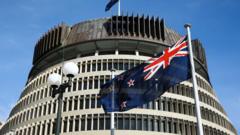In a clear stance regarding the use of Māori language in parliamentary proceedings, New Zealand's Speaker, Gerry Brownlee, has stated that lawmakers are free to use the term Aotearoa without further complaint. Aotearoa, translating to "land of the long white cloud," is a commonly accepted name for New Zealand, appearing on passports, currency, and in the Māori version of the national anthem. This announcement comes after Deputy Prime Minister Winston Peters called for a ban on the name's usage and proposed that any change to the country's nomenclature should require a referendum.
While the formal legal title of the nation remains New Zealand, and changing that title necessitates legislation, the cultural significance of Aotearoa has gained increasing recognition. The name has been embraced in several areas of New Zealand life, including its regular use in Parliament, where MPs are permitted to speak in English, Māori, or New Zealand Sign Language.
Tensions arose after Green MP Ricardo Menéndez March, originally from Mexico, used Aotearoa during a parliamentary session, leading Peters to question the legitimacy of a new citizen commenting on the nation's name without public approval. Fellow Māori member Shane Jones criticized recent immigrants for challenging the indigenous viewpoint on the country’s nomenclature.
Brownlee had earlier suggested the name Aotearoa New Zealand as a way to avoid confusion, yet emphasized that MPs should not be constrained by others' preferences. The debate reflects a broader cultural shift in New Zealand, where the recognition and incorporation of Māori language have surged due to advocacy from indigenous leaders.
Winston Peters opposed Brownlee's ruling, asserting that while he respects Māori language, he cannot accept its use in Parliament. This division illustrates the ongoing complexities surrounding New Zealand's identity, highlighted by a petition launched by the Māori Party in 2022, which called for an official name change to Aotearoa, garnering significant public support.
The current government has initiated efforts to prioritize English names in official communications while also seeking to redefine aspects of foundational documents like the Treaty of Waitangi, drawing both support and backlash. As discussions continue, the future of New Zealand's name maintains a prominent place in political discourse and public consciousness.


















